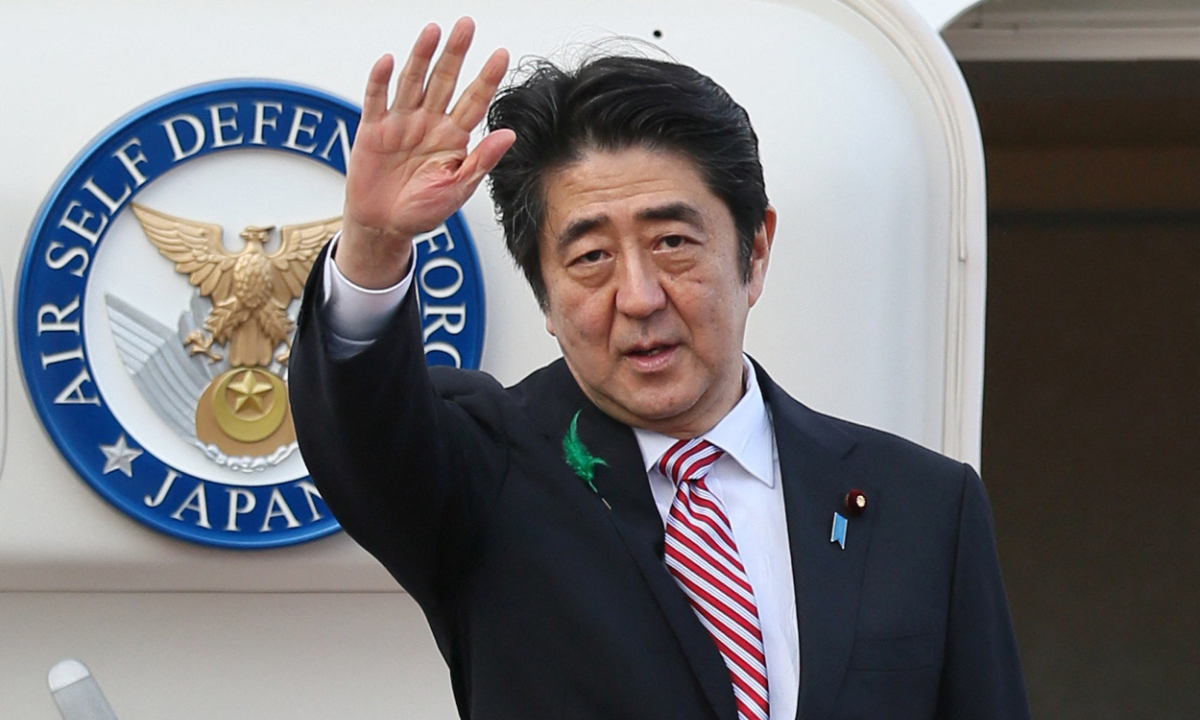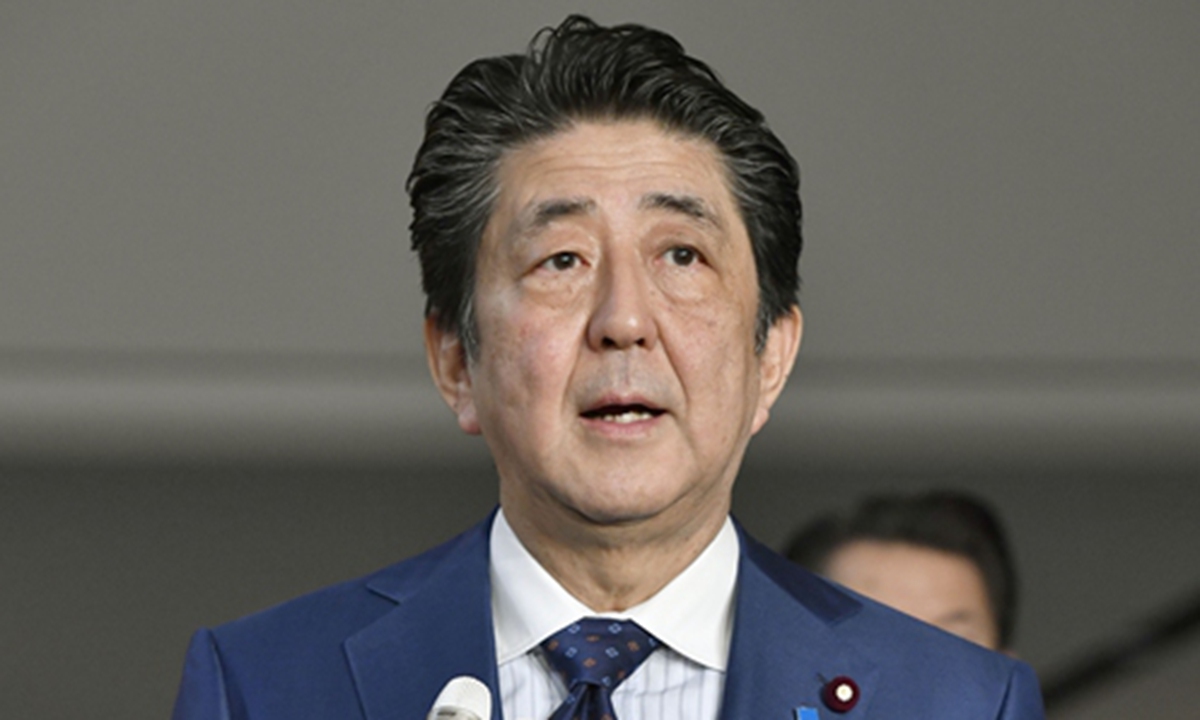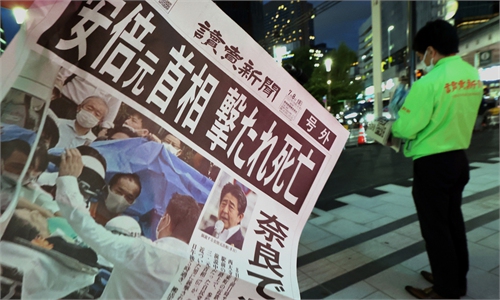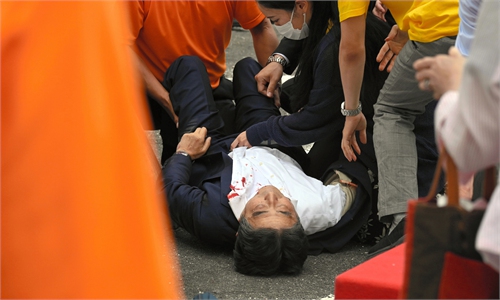Condolences from world leaders underscore Abe’s diplomatic flexibility; incident may deepen link between US-Japan right wing forces: expert

In this file photo taken on April 21, 2015 Japanese Prime Minister Shinzo Abe waves as he headed for Indonesia at the Tokyo International Airport. Photo:AFP
World leaders are sending condolences on the sudden passing of former Japanese Prime Minister Shinzo Abe and commemorating his diplomatic contributions to Japan which were marked by flexible and soft gestures, analysts said, while some also warned that Japanese right wing forces may take advantage of the incident to push for further conservative shift of Japanese policies, and pointed out that some US politicians paid tribute to Abe as a strong "anti-China" figure and "father" of the Indo-Pacific concept and Quad.
Abe was shot dead by a gunman on July 8 in Nara, Japan, while campaigning for the parliament's upper house election to be held on Sunday, shocking Japan and the world.
On Saturday, Chinese President Xi Jinping sent a message of condolences to Japanese Prime Minister Fumio Kishida on the "sudden and unfortune" passing of Abe. Chinese Premier Li Keqiang also sent condolence to Kishida on Saturday.
On the same day, US President Joe Biden held a telephone conversation with Kishida and expressed condolences. Many world leaders, including Russian President Vladimir Putin, Indian Prime Minister Narendra Modi, South Korean President Yoon Suk-yeol have also offered condolences.
The condolent messages coming from many world leaders underscored Abe's active role in helping Japan dealing with complicated international relations and his practical attitudes with more diplomatic flexibility, analysts said.
To Japan, Abe is an irreplicable politician with a remarkable influence in Japan's politics, economy and diplomacy, Da Zhigang, director of the Institute of Northeast Asian Studies at Heilongjiang Provincial Academy of Social Sciences, told the Global Times, noting that for example, Abenomics has benefited Japanese enterprises and helped to stabilize the Japanese economy to some extent amid the pandemic shock.
Abenomics, which Abe launched in 2013 to jumpstart the economy after more than two decades of deflation and involved ramping up government spending and monetary, was deemed as one of Abe's most famous and lasting legacies by Japanese and global analysts.
During his eight years as Japanese prime minister, Abe also helped Japan to gain more diplomacy flexibility amid complicated global situations by actively implementing what he called "chikyuugi-fukan-gaiko" - diplomacy taking a panoramic view of the world map, and "sekkyokuteki-heiwa-shugi" - proactive contribution to international peace, Da said.
For example, from 2012 to 2018, Abe made 73 overseas visits to 78 countries and regions. While maintaining alliance with the US, Abe also actively built relations with countries in South Asia, the Middle-East and Europe, and at the same time developed practical relations with neighbors, Da said.
The expert noted that Abe's flexibility had been displayed in his handling of relations with China and the US - trying to strike a delicate "balance" between China and the US to maximize Japan's leverage.

Shinzo Abe Photo: IC
Many experts reached by the Global Times said that Abe had made positive contributions to improve Japan's relations with China, marked by two icebreaking trips to China in 2014 made after Japan's ludicrous territorial claim over the Diaoyu Islands which dragged bilateral relations to abyss and 2018 when he attended events marking the 40th anniversary of the signing of the China-Japan Treaty of Peace and Friendship and a forum promoting infrastructure cooperation between companies of the two countries. In 2017, Abe publicly expressed willingness to cooperate with China on the Belt and Road Initiative and said he would not rule out joining the China-headquartered Asian Infrastructure Investment Bank.
The series of moves and remarks have offered a good chance to improve China-Japan relations and it is undeniable that Abe made positive efforts for bilateral ties, Liu Qingbin, an expert on Japan from Huaqiao University, told the Global Times.
Analysts noted that Abe was known for being "flexible" and "knowing when to yield and when not to" and such characteristics have also demonstrated in his interactions with other world leaders. During his foreign visits, he was often caught on camera for funny anecdotes.
For example, in September 2015, when meeting with Putin at the UN headquarters in New York, Abe performed what some media described as "little shuffle-jog" straight toward Putin. While playing golf with then US President Donald Trump in November 2017, Abe fell into a bunker with footage of the embarrassing moment going viral on social media and some Japanese netizens criticized him for "humiliating Japan." Abe later responded in a speech in Tokyo in December 2017 that he pulled himself back up like nothing happened and continued to play. He also noted that Trump was impressed by his reaction and said it was more wonderful than any gymnast.
"To Abe, running toward Putin or falling in front of Trump is not a big deal. Such flexibility and soft gestures of Abe have helped enrich Japan's diplomatic resources and Abe's successors have benefited from this legacy," said Da.
However, despite his noted diplomatic style, Abe has also faced criticism for his push to reinterpret Japan's constitution to end the ban on allowing its military forces to exercise the right to collective self-defense, which raised alarm among regional countries. Domestically, his policies were criticized for further polarizing the Japanese society.
Moreover, Abe's wrong words and deeds after stepping down almost offset all the efforts he once made in improving China-Japan ties. Lü Chao, director of the Institute of the US and East Asian Studies at Liaoning University, said Abe spoke his mind after stepping down and acted unscrupulously over the Taiwan question.
Lian Degui, director of the Department of Japanese Studies at Shanghai Institutes for International Studies, told the Global Times that after stepping down, Abe's attitude on the Taiwan question was what Washington wanted the Japanese government to declare. However, Tokyo doesn't want to provoke Beijing completely, so these words can only be said by a former leader.
Lian believes Abe is a representative of the Japanese right wing's collusion with the US conservatives to confront China even further. John Bolton, the national security adviser to former US president Donald Trump and a China hawk, wrote on Twitter Saturday that Abe "believed Japan was fully capable of taking a central and responsible role in global affairs becoming a player in confronting China and North Korea." Some other members of the US Congress, including Republican senator Ted Cruz and representative Dan Crenshaw, have expressed similar views on social media.
Da worried that as a two-time prime minister and leader of the largest faction in Japan's ruling Liberal Democratic Party (LDP), Abe used to balance the radical right-wing forces and avoid closely tying up with the US. But after his death, the Japanese right-wing forces may use this incident to push forward the trend of conservative shift in Japanese politics and tie Japan to US' chariot.
Abe's supporters will also continue to promote "free and open Indo-Pacific" and his other policies, bringing more security risks to Northeast Asia, analysts said, warning regional countries of the rise of Japan's radical right-wing forces.


